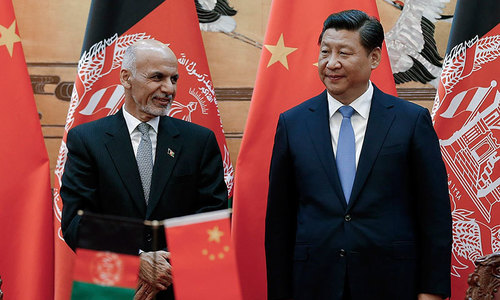US President Donald Trump has given Defence Secretary Jim Mattis the authority to set troop levels in Afghanistan, a US official told Reuters on Tuesday, opening the door for future troop increases requested by the US commander.
The official, who spoke on condition of anonymity, said no immediate decision had been made about the troop levels, which are now set at about 8,400.
The Pentagon declined to comment.
The decision is similar to one announced in April that applied to US troop levels in Iraq and Syria, and came as Mattis warned Congress the US-backed Afghan forces were not beating the Taliban despite more than 15 years of war.
"We are not winning in Afghanistan right now," Mattis said in testimony to the Senate Armed Services Committee earlier on Tuesday. "And we will correct this as soon as possible."
Mattis said the Taliban were "surging" at the moment, something he said he intended to address.
A former US official said such a decision might allow the White House to argue that it was not micromanaging as much as the administration of former President Barack Obama was sometimes accused of doing.
Critics say delegating too much authority to the military does not shield Trump from political responsibility during battlefield setbacks and could reduce the chances for diplomats to warn of potential blowback from military decisions.
It has been four months since Army General John Nicholson, who leads US and international forces in Afghanistan, said he needed "a few thousand" additional forces, some potentially drawn from US allies.
Current and former US officials say discussions revolve around adding 3,000 to 5,000 troops. Those forces are expected to be largely comprised of trainers to support Afghan forces, as well as air crews.
Deliberations include giving more authority to forces on the ground and taking more aggressive action against Taliban fighters.
Some US officials have questioned the benefit of sending more troops to Afghanistan because any politically palatable number would not be enough to turn the tide, much less create stability and security. To date, more than 2,300 Americans have been killed and more than 17,000 wounded since the war began in 2001.
Any increase of several thousand troops would leave American forces in Afghanistan well below their 2011 peak of more than 100,000 troops.
The Afghan government was assessed by the US military to control or influence just 59.7 per cent of Afghanistan's 407 districts as of Feb 20, a nearly 11 percentage-point decrease from the same time in 2016, according to data released by the US Special Inspector General for Afghanistan Reconstruction.
The broader regional US strategy for Afghanistan remains unclear. Mattis promised on Tuesday to brief lawmakers on a new war strategy by mid-July that is widely expected to call for thousands more US troops.
Senator John McCain, the chairman of the Armed Forces Committee, pressed Mattis on the deteriorating situation during the Tuesday hearing, saying the United States had an urgent need for "a change in strategy, and an increase in resources if we are to turn the situation around."
"We recognise the need for urgency," Mattis said.
On Monday Mattis told a congressional panel late that the Trump administration’s Afghan policy would also look at impact of the rivalry between Pakistan and India on the situation in Afghanistan.
Mattis said he would present the new policy to President Donald Trump “very soon” and it would include options to enhance US military presence in Afghanistan.
The defence secretary said it was important to have a regional approach to Afghanistan because it could have far-reaching ramifications not just for the war on terror but security for South and Central Asia.
“We’re taking a regional approach to this,” he told the House Armed Services Committee. “We’re looking at everything from the situation between India and Pakistan, Pakistan and Afghanistan; obviously Iran and that whole South Asia area.”
Mattis said the “regional strategy” would be “connected to the geographic reality of where this enemy is fighting from. As you know, it’s not just from Afghanistan”.
The US media interpreted this as a reference to earlier US claims that the Taliban, particularly the Haqqani network, were still using sanctuaries in the Federally Administered Tribal Areas (Fata) to launch attacks in Afghanistan.
Pakistan strongly rejects the allegation, saying that it has eliminated all terrorist sanctuaries in Fata and the Haqqani network has now moved to Afghanistan and is using its bases there to plan and execute attacks.
But Secretary Mattis insisted that focusing on Afghanistan alone would not end the decades-old fighting that has torn apart that country. “If we look at it [Afghanistan] in isolation, we’ll probably have something that’s lacking in some area,” he said.
“We are going to have to recognise that problems that come out of ungoverned spaces like that as we experienced on 9/11... do not stay there. They can come home to roost here.”
This was apparently a reference to the Taliban-led Afghanistan, which sheltered Osama bin Laden and other Al Qaeda members who orchestrated the Sept 11, 2001 terrorist attacks in the United States.















































